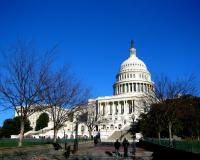
Vibrant Environment
Governance And Rule Of Law
All | Biodiversity | Climate Change and Sustainability | Environmental Justice | Governance and Rule of Law | Land Use and Natural Resources | Oceans and Coasts | Pollution Control

Flushable wipes have proven to not be so flushable and are wreaking havoc on some of the world’s major cities. Municipalities like New York City, spend millions of dollars to remedy clogging issues the wipes cause. New York City officials said in 2015 that "wipe-related equipment problems," have cost the city more than $18 million since 2010.

At James W. Rubin’s memorial service on November 4, 2017, a vast network of friends and colleagues remembered him for his brilliant mind, relentless spirit, infectious sense of humor, and unwavering dedication to his family. The four of us consider ourselves fortunate to have worked closely with Jim at the U.S. Department of Justice in the Environment and Natural Resources Division (ENRD) and to be his friends.

Following President Trump’s announcement that he was reducing the size of the Bears Ears and Grand Staircase-Escalante National Monuments, there have been questions as to the extent of the executive branch’s power to manage federal lands. The announcement has put the Antiquities Act, which grants the president the authority to protect federal lands, under a microscope. Recently, two cases concerning the U.S.

December 10, 2018, will mark the 70th anniversary of the U.N. General Assembly’s adoption of the Universal Declaration of Human Rights in 1948. The Declaration outlines inalienable rights entitled to every human being, regardless of race, ethnicity, religion, sex, language, political or other affiliation, social or national origin, birth, or other status.

Last month, Trump Administration officials attended the latest round of U.N. climate negotiations in Bonn, Germany, but they weren’t there to discuss reducing emissions. Rather, they touted the promises of nuclear energy, natural gas, “clean coal,” and carbon capture. This is not surprising, given the President’s views on climate policy and his decision to withdraw the United States from the Paris Agreement. But even had Trump decided otherwise, the current Agreement does not do enough to reduce the risk of catastrophic climate change.

On October 24, 2017, Sen. Cory Booker (D-NJ) and Rep. Raul Ruiz, M.D. (D-CA) announced The Environmental Justice Act of 2017 (EJA), S. 1996, H.R. 4114, a bill focused on strengthening legal protections against environmental harms for communities of color, low-income communities, and indigenous communities. The EJA would be the first federal law of its kind, and follows in a 25 year legacy of legislative efforts, starting with the great Rep. John Lewis (D-GA) in the 1990s, to codify environmental justice (EJ) once and for all.

International illegal wildlife trade (IWT) threatens global biodiversity, imperils certain charismatic species, and fuels organized crime. Wildlife trafficking is the world’s fourth most lucrative crime, after only the trafficking of drugs, humans, and arms. Approximately 350 million plants and animals are sold on the black market every year, with an estimated value of between US $7 billion and $23 billion.

On October 18th, the Environmental Law Institute hosted its annual ELI Award Dinner. Affectionately known as the “environmental law prom,” over 650 of the best and brightest environmental professionals from across the country descended upon Washington, D.C., to connect with colleagues and honor this year’s winner of the ELI Environmental Achievement Award.

EPA Administrator Scott Pruitt’s “back to basics” agenda for the Agency suggests a renewed focus on the fundamentals of environmental protection. But according to a new article in the November 2017 issue of the Environmental Law Reporter, “Pruitt is not preserving the ‘basics’ of our environmental protection system, but deconstructing them.”

Electronic waste, or e-waste, is the fastest-growing segment of the municipal waste stream. Nearly 100% is recyclable, and valuable materials like plastics, metals, and glass can be recovered. E-waste also can contain toxic materials, like lead, mercury, and arsenic. Worldwide, up to 50 million tons of e-waste is expected to be dumped in 2017. Yet, in the United States, less than 30 percent is recycled.